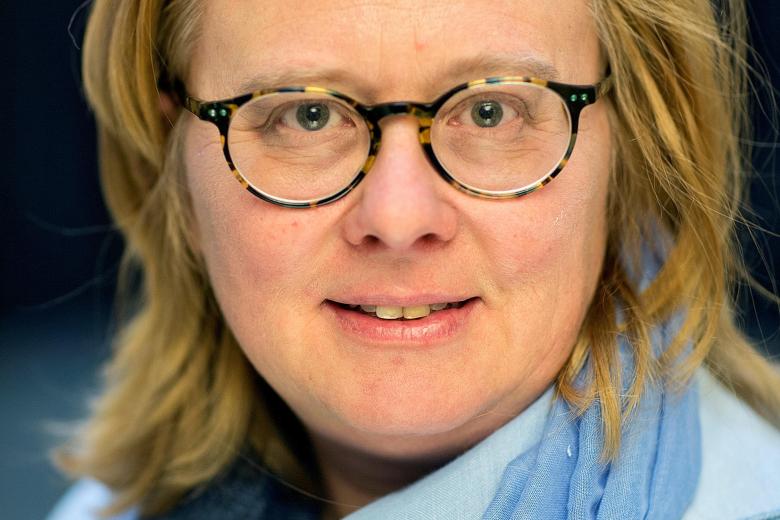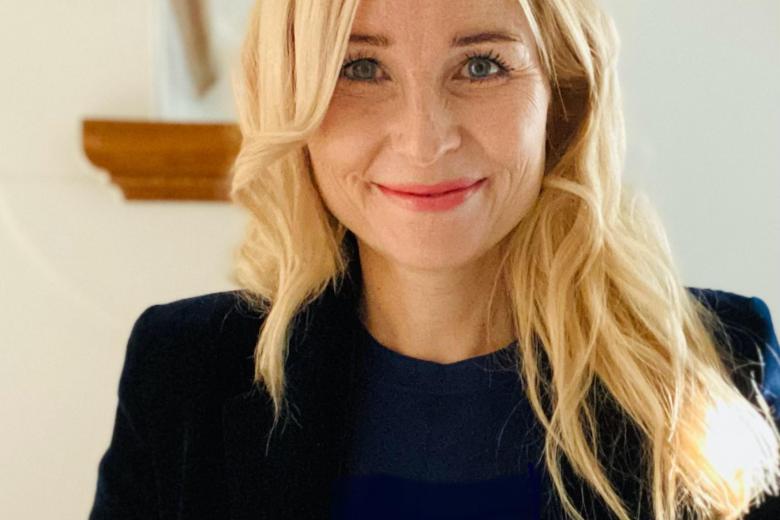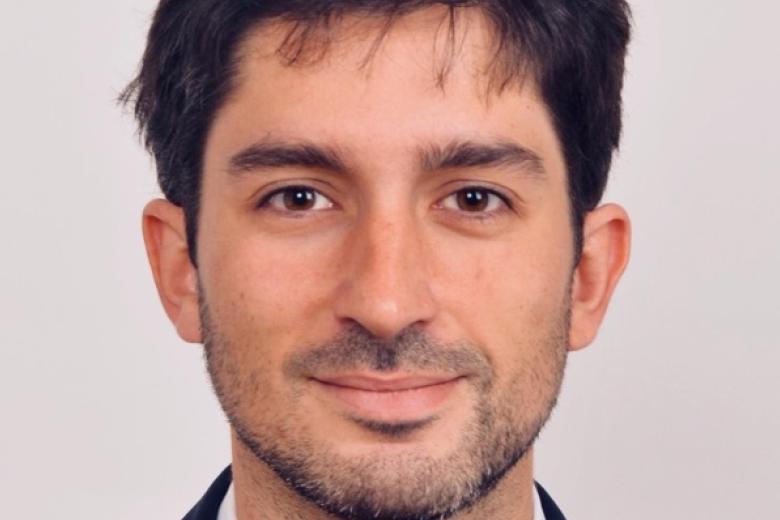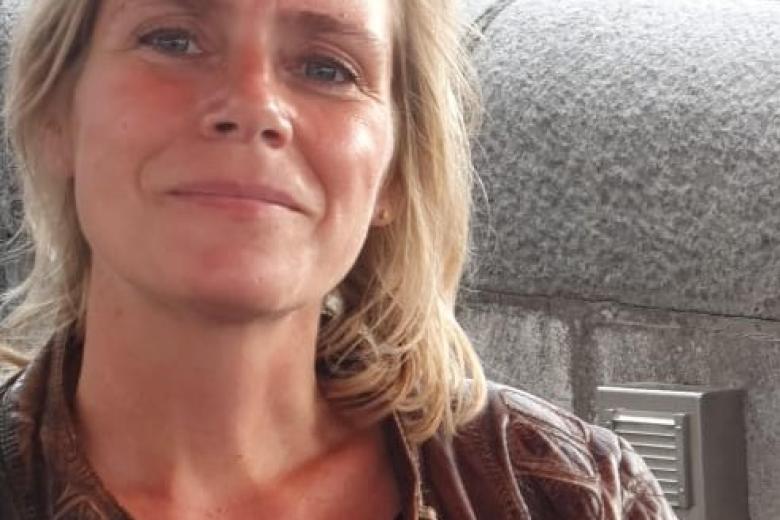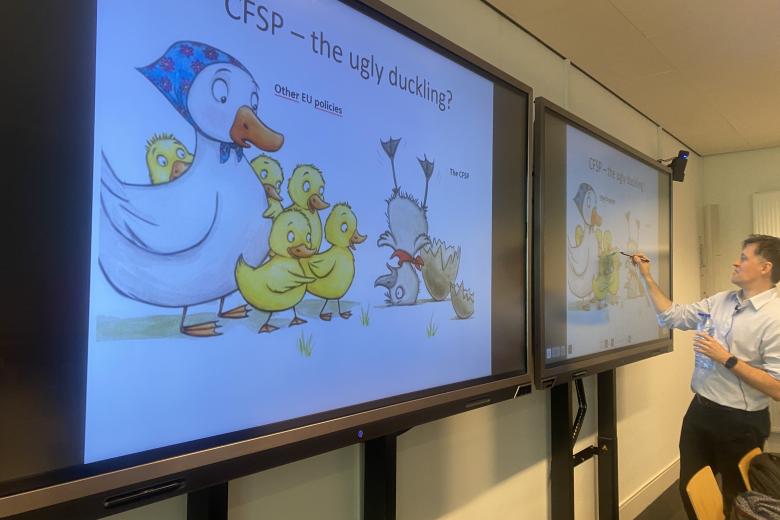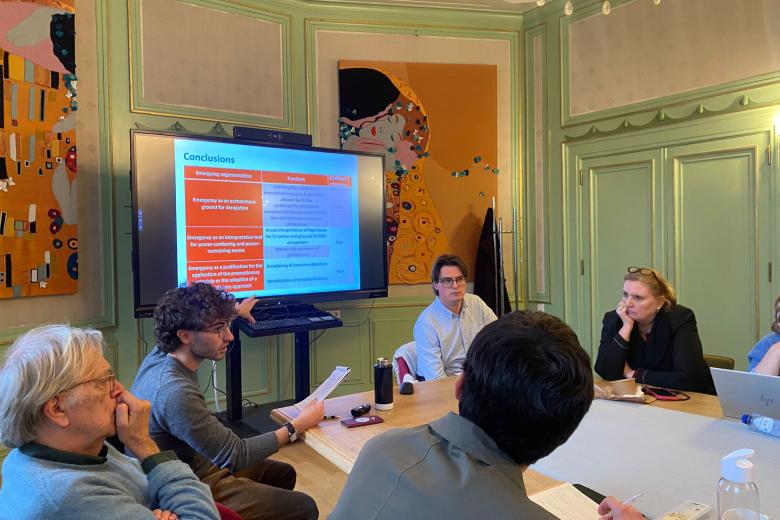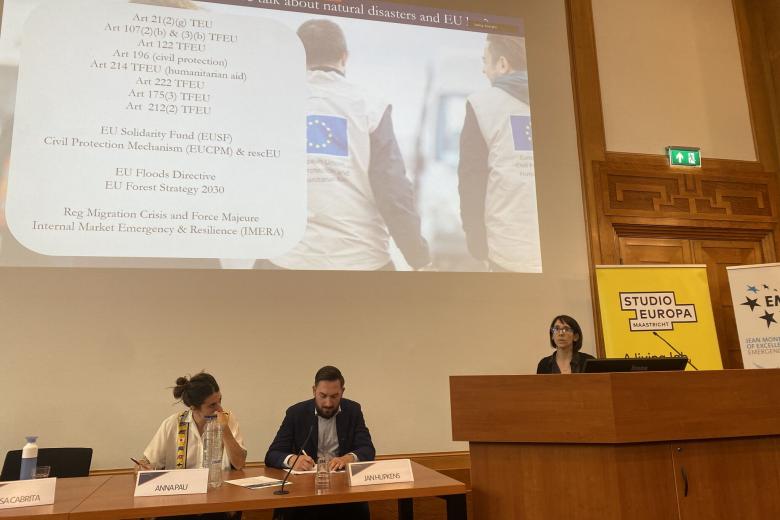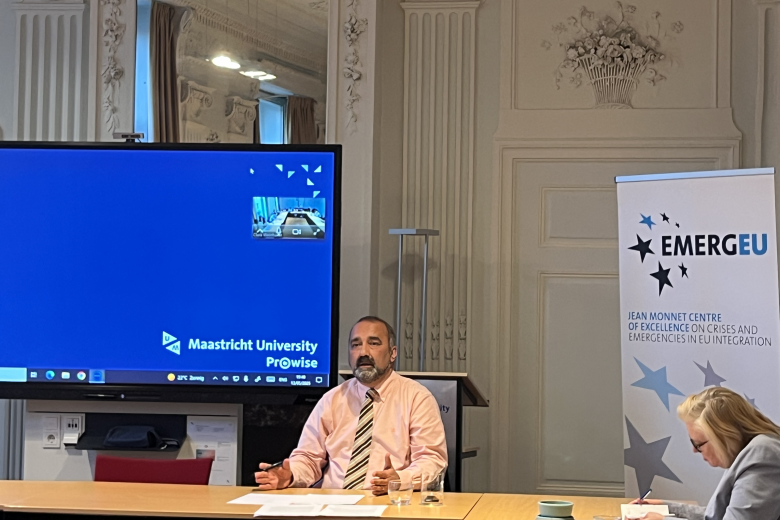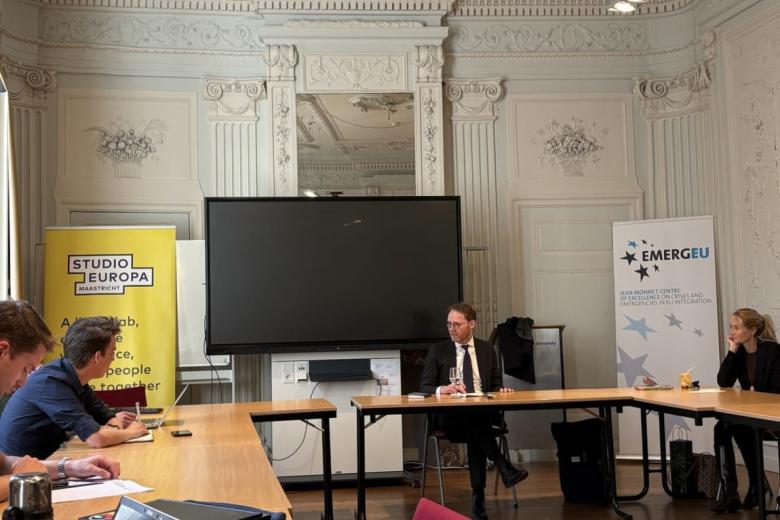EmergEU
The Jean Monnet Centre of Excellence on Crises and Emergencies in EU Integration (EmergEU) is devoted to a common interdisciplinary research agenda and embedded within the existing interdisciplinary Centre for European Research in Maastricht (CERiM).
Acknowledgements
This project is part of the Erasmus+ programme.
The project is co-funded by the European Union. Views and opinions expressed are however those of the author(s) only and do not necessarily reflect those of the European Union or the European Education and Culture Executive Agency (EACEA). Neither the European Union nor EACEA can be held responsible for them.
The project is also financially supported by Studio Europa.
What is EmergEU?
Background
Throughout its history, the EU has been increasingly faced with crises and emergencies that have threatened its core values and required extraordinary responses, significantly affecting the EU’s institutional structures and policy-making. These challenges have touched upon a variety of areas and sectors, affecting, for example, the EU’s economic, migration, energy, and health policies.
Framework
EmergEU explores how the EU has responded to past crises and emergencies and assesses potential legal and policy changes to enhance the EU’s resilience. In doing so, EmergEU leverages the well-established CERiM network, which brings together lawyers, political scientists, social scientists, economists, and historians.
Aims
EmergEU pursues the following objectives:
conducting cutting-edge research and analysing crises and emergencies from an interdisciplinary perspective to achieve measurable and comparable results;
conceptualising EU crisis and emergency action by assessing institutional challenges and identifying areas in need of reform;
creating an inventory of the EU's toolbox for addressing crises and emergencies across different policy areas;
drawing conclusions on how existing mechanisms should be reformed or adapted within the current legal and institutional framework;
engaging with policymakers and the public to share research findings and insights.
Events, workshops and lectures
Planned events, workshops and lectures will appear here. Keep an eye on this webpage to stay up to date on upcoming activities.
Past events
| Name event | By | Date |
| The role of conversations and camaraderie in countering societal and political breakdown | Hakan Altinay | 13 May 2025 |
| An agile and responsive EU: Strategies for a resilient future | Robert de Groot | 27 March 2025 |
| Emergency politics, democracy, and constitutionalism in Europe | Christian Kreuder-Sonnen | 5 February 2025 |
| A Union of Crisis: EU Action in Times of Emergency - Talk @ PAS Festival Maastricht | Andrea Ott and Guido Bellenghi | 7 September 2024 |
Research
The research of EmergEU is divided into three main themes. Within these themes, three workshops will be organised, along with additional teaching and research activities, including Jean Monnet lectures and guest lectures. The three main themes are:
Framing of the terms, conceptual background and institutional challenges.
Case studies on internal crises and emergencies, including challenges relating to: (1) health crises and internal market challenges in cross-border regions; (2) the Economic and Monetary Union; and (3) the rule of law.
Case studies on external crises and emergencies, including challenges relating to: (1) the EU environmental and energy security policies; (2) the EU migration and asylum policy; and (3) the EU as a global crisis actor.
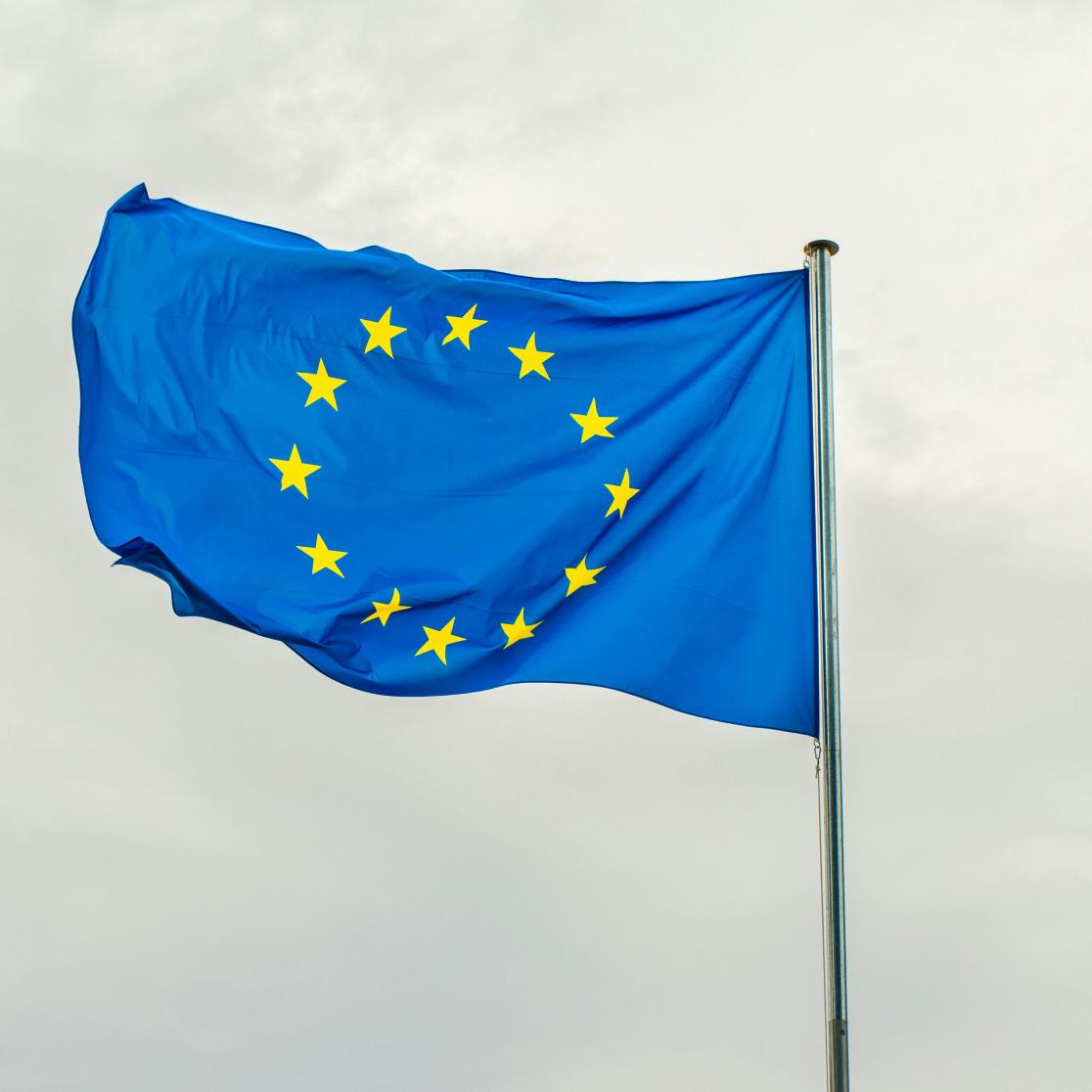
Researchers
News
Journal articles and other publications
- Hupkens, J. (2025). Same, Same, but Different Effects: Why Did the Euro and EU Migration Crisis Lead to Different Integration Outcomes? Risk, Hazards and Crisis in Public Policy, 16(4), Article e70037. https://doi.org/10.1002/rhc3.70037
- Luque Lora, J. (2025). Beyond Dialogue: The Case for More European Parliament Involvement in Conditionality: Enhancing Transparency, Institutional Balance and Democratic Oversight in Spending Governance. EU Law Live Weekend Edition, (234), 1-12. https://eulawlive.com/weekend-edition/weekend-edition-no234/#
- Bellenghi, G. (2025). Good Health and Bad Memory: The Internal Market Emergency and Resilience Act as a Legislative State of Emergency. EU Law Live , 230, 1-10. https://eulawlive.com/weekend-edition/weekend-edition-no230/
Bellenghi, G. (2025). Neither Normalcy nor Crisis: The Quest for a Definition of Emergency under EU Constitutional Law. European Journal of Risk Regulation, 1-20. Advance online publication.https://doi.org/10.1017/err.2025.17
Peerboom, F. (2024). De nationale uitzonderingstrek en de (vergeten) rol van het EU noodrecht in ‘asielcrises’. De Hofvijver, 14(60). https://www.montesquieu-instituut.nl/9394000/1/j9vvllwqvzjxdyx/vmj3elid5aoh?pk_campaign=hofv-2412&pk_kwd=vmj3elid5aoh (The domestic desire for exceptions and the (forgotten) role of EU emergency law in 'asylum crises')
- Bellenghi, G. (2024). The European Parliament's Proposal For An Eu State Of Emergency Clause: A Comparative And Constitutional Analysis. Croatian Yearbook of European Law & Policy, 20, 1-30. https://doi.org/10.3935/cyelp.20.2024.586
- Halilovic, A. (2024). Executive Migration Governance and Law-making in the European Union: Towards a State of Exception. European Papers : a journal on law and integration, 9(2), 513-527. https://doi.org/10.15166/2499-8249/769
EmergEU Working Paper Series
Teaching
Past events
| Name event | By | Date |
| The evolution and challenges concerning the Common Foreign and Security Policy | Lóránt Havas | 27 May 2025 |
| Defending our way of life. Why European political values matter in times of geopolitical upheaval | Rein Dekkers | 7 April 2025 |
